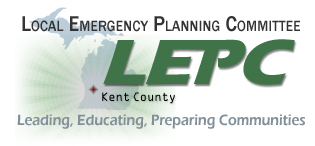Sheriff's Office
LEPC - Chemical Safety Information for Families
Home Safety Kits | Childcare Emergency Plan | Links and Phone Numbers | Household Chemical EmergenciesThis site will help you to develop an emergency plan, provide information on how to assemble an Emergency Supply Kit, and provide contact telephone numbers and websites which can assist you during an emergency.
Home Safety Kits
Kent County’s Emergency Management Office and the Local Emergency Planning Committee (LEPC) have been promoting home safety kits as an all hazards approach to preparedness. The purpose of a home safety kit is to have your emergency supplies in one place so that in the event of an emergency you can rapidly locate your emergency supplies. The home safety kit should include a radio with batteries, flashlight, first aid kit, plastic sheets, duct tape, scissors, water and snacks. The supplies can be used for a variety of emergency situations such as severe weather, tornados, chemical spills, power outages or even a terrorist attack. Every family should develop an emergency action plan. You also need to develop a communications strategy so family members can report their location and condition during a critical event.
Emergencies can happen at any time. Local officials and relief workers will be on the scene after a disaster, but they cannot reach everyone right away. The best way to make you and your family safer is to be prepared before an emergency occurs.
15 Steps to Take If There is a Chemical Emergency
Chemical Emergency Events will only affect a limited area.
Listen to local radio or television stations for detailed information and instructions. Follow the instructions carefully. You should stay away from the area to minimize the risk of contamination. Remember that some toxic chemicals are odorless.
The following websites have guidelines, checklists and information how to prepare an emergency kit and develop a family emergency plan.
Childcare Emergency Plan Guidelines and Checklists
Schools, childcare centers and health care facilities should have clear plans for chemical emergencies. If there is an emergency, don’t call these facilities to check on your loved ones and don't go there. Traffic and telephone tie-ups may interrupt their emergency plan. If you have a child in school or daycare it’s a good idea to request a copy of their emergency plan and go over it with your child to be sure you both understand it.
For more information on educating children about emergencies and how to be prepared, go to the educator’s link. The more children know about how to protect themselves from disasters the better prepared they are and being better prepared is their best defense.
Links for Families
- MSP Family Preparedness Guide
- Get Ready Kent
- Kent County Disaster Mental Health & Human Services Committee
Citizen preparedness fact sheets and videos
- Readiness Quotient: Test Your RQ
How prepared are you? Take this ten-question assessment and find out!
What to do with pets in an emergency
For people with disabilities- Ready America
Preparedness resources, planning templates and an instructional video for people with disabilities. - Disaster Resources for People with Disabilities, Disability-related Organizations & Emergency Managers & Planners.
Emergency Phone Numbers
- Police - 911
- Fire - 911
- Ambulance - 911
- Kent County Sheriff's Office - (616) 632-6100
- Michigan State Police (local post) - 616) 336-3367
- FBI (Grand Rapids Office) - (616) 456-5489
- Homeland Security - (517) 336-6198
- Kent County Office of Emergency Management - (616) 632-6255
- Kent County Health Department - (616) 632-7100
- American Red Cross (local) - (616) 456-8661
Household Chemical Emergencies
Nearly every household uses products containing hazardous materials or chemicals. Although the risk of a chemical accident is slight, knowing how to handle these products and how to react during an emergency can reduce the risk of injury.
The Red Cross website on chemical emergencies describes the hazards of household chemicals and what to do in an emergency.
Kent County’s Household Hazardous Waste Program is there to provide residents the opportunity to get unwanted household chemicals out of the house before there’s a fire, a poisoning or a toxic exposure.

www.accesskent.com/LEPC | (616) 632-6256

 Michigan State Police
Michigan State Police Ready
America
Ready
America FEMA
FEMA American Red
Cross
American Red
Cross